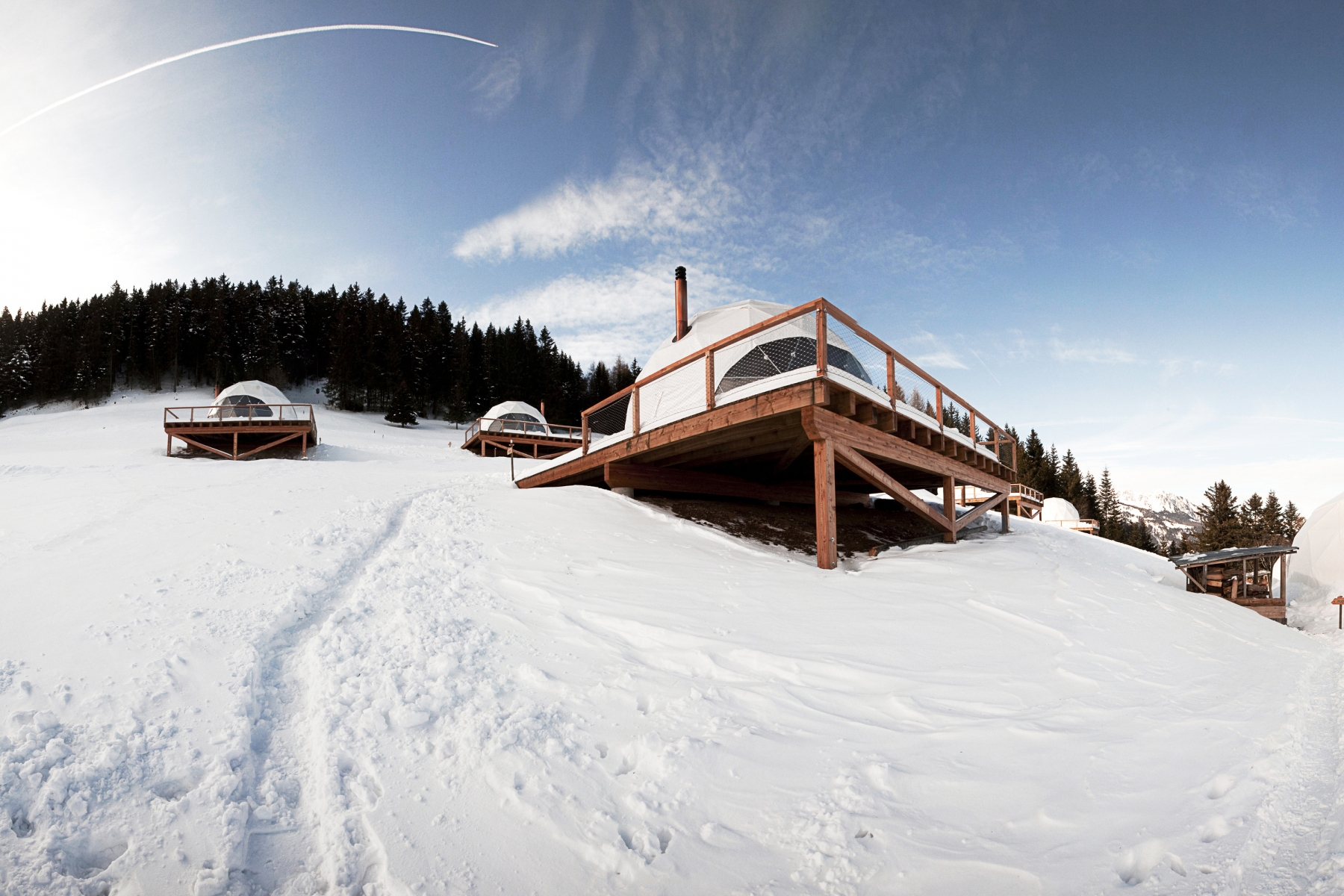This website uses cookies to ensure you get the best experience on our website. To read our full cookie policy please click here.
Ski Resorts: Who is leading the way in sustainability?
A focus on change
By Abigail Butcher
Ski resorts are not the first places where energy-efficiency springs to mind; but over the past decade this has changed as resorts increasingly realise the need to shout about their sustainability and environmental work.
Almost every ski resort around the world is now focussing on making their operations more sustainable, moving towards zero carbon emissions, green energy production and taking care of their surroundings.
Otherwise, the sport as we know it will not last.
Disappearing glaciers, retracting snow lines and the appearance of microplastics everywhere has shocked us all into action — with the ski industry leading the charge.
Sustainability comes in many forms, and beneath headline-grabbing numbers are countless smaller initiatives and individuals committed to making a difference.
Here is our pick of just a few:
Pic courtesy of the Aspen Ski Co.
France
Morzine
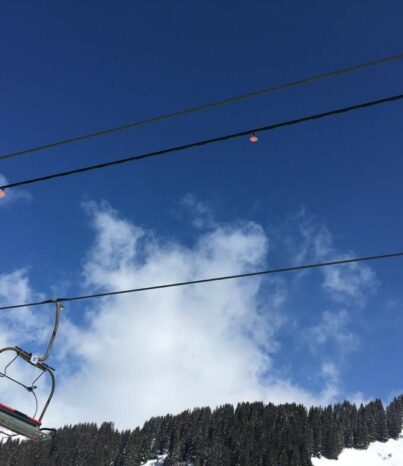
Pic courtesy of Morzine
This resort is making massive strides in sustainability and environmental responsibility. ‘Visualisers’ are being fitted on all ski lift cables to reduce bird collisions, and when a tree is cut down within the ski area, another is planted.
Some 93% of hotels and restaurants use eco-friendly cleaning products, many offering organic and eco-friendly toiletries to guests — with extra initiatives from individual businesses like Le Bergerie et Le Dahu working with UNISOAP, which recycles soap for those in need.
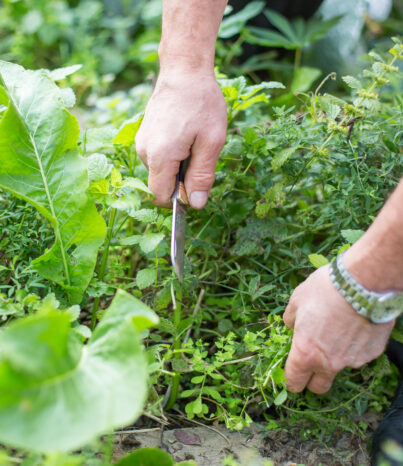
Pic courtesy of Morzine
The food focus has shifted to local; with 17 businesses growing their own herbs, 15 growing fruit and veg and 11 composting green waste.
Some 28 businesses buy cheese from local farms, 17 serve locally-brewed beer and 26 source bread and pastries from local bakeries. Inspired by Surfers Against Sewage, local artist Barbara De Moubray set up the non-profit association Montagne Verte to help the community make greener decisions.
Serre-Chevalier
One of the few resorts with a Green Globe certification for sustainable development in tourism, Serre Chevalier invested €3.6m on its Renewable Energy project in 2016. Since then it has installed hydroelectricity, photovoltaics and small wind turbines with the plan of producing up to 50% of the area’s total electricity requirements by 2030. Serre Chevalier’s 1,420 photovoltaic panels are made by a local company, SunWind Design, and specifically designed to be uniquely flexible, for use on existing buildings.
Les Arcs and La Plagne

Pic Courtesy of Eau Des Arcs, Les Arcs
Easily reached by train, the Paradiski ski area has been using 100% renewable energy (wind and solar power and hydroelectricity) for nearly a decade to power its lifts.
Among many other initiatives, we like the Les Arcs #DrinkLocal campaign to reduce the phenomenal 1m plastic bottles of water drunk every year. With the plan of banning plastic entirely, #DrinkLocal (launched winter 2020/21) encourages visitors to drink tap water and for hotels and restaurants to serve tap instead of bottled.
New water fountains have been installed across the ski area and branded, reusable water bottles are on sale everywhere.
Italy
Pejo 3000
After discovering its nearby Forni glacier contained microplastics, in 2019 the small resort of Pejo 3000 in Trentino became the first ski resort to ban single-use plastics. Pejo 3000 is also powered by three hydroelectric plants and artificial snow is produced using water recovery systems.
Cortina
This resort has made the bold pledge to co-host with Milan the 2026 Winter Olympics the “most sustainable ever”. There are so many initiatives to talk about but we like the fact the event will be carbon-neutral, with a complete ban on food and drink single-use plastics. All venues will have water stations and 100% of unused food will be recovered. Any new permanent buildings will be built with LEED (an internationally recognised green building certification system) and all wood used will be sustainably sourced. All suppliers to the Games will have to abide by “Green and Social Procurement Guidelines”.
San Martino di Castrozza
This resort in Trentino, along with nearby Passo Rolle, Primiero and Vanoi, has long been keeping its ecological impact low. For more than a century, San Martino has been powered by renewable electricity and has embraced the “Green Way Primiero” initiative promoting environmental excellence. This includes things like free multiple electric car charge points, a bike sharing scheme and environmental tours for tourists.
Austria
Kaprun
Back in 2003, Kaprun introduced an integrated management system, appointing internal officers for environment, waste disposal, water and wastewater management. The entire lift system and all catering outlets run on renewable energy, and the Kitzsteinhorn lift company works closely with the Salzburg Institute for Ecology on the re-cultivation and re-vegetation of areas above the treeline. Targeted ‘snow farming’ protects the glacier and there are free buses between Kaprun and nearby Zell-Am-See to reduce resort traffic.
SkiWelt, Austria

Pic Courtesy of SkiWelt Austria
The SkiWelt is one of Austria’s biggest linked ski areas, encompassing Söll, Hopfgarten, Ellmau and Westendorf among others and has pioneered sustainable ski resort technology.
In 2008, the SkiWelt opened the world’s first solar-powered ski lift and at the same time installed a heat-recovery system at its top lift station to heat the Choralpe mountain restaurant.
In Hopfgarten, the SkiWelt installed the first electric car charging points in a cable car station (there are now 17 across the area) and there are waste heat and water management systems across all resorts.
The snow-making system runs on 100% green energy, with GPS-controlled snow management system to minimise wastage.
Ischgl

Pic Courtesy of Ischgl
Crowned in winter 2019/20 the “largest climate-neutral ski resort in the Alps”, ski lifts are powered almost entirely by renewable energy. Some restaurants and the forthcoming Silvretta Spa (opening winter 2022/2), are heated by geothermal energy and solar and heat-recovery systems, allowing the region to save 80,000 litres of heating oil annually.
The resort offsets any CO2 emissions by supporting a reforestation project in Peru, as well as local programmes in Paznaun and Ischgl.
One nice touch is that at the end of the season, employees clean beneath the lift lines, picking up cigarette butts and litter thrown from the lifts.
Switzerland
Laax
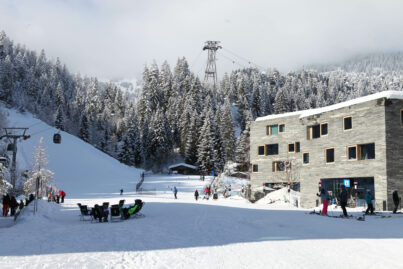
Pic courtesy of rocksresort Hotel
Reto Gurtner, president and chairman of Laax’s rockresort development started to make sustainable decisions back in the 1970s when he says his “eyes were opened to the ecological movement”.
Aiming to be the world’s first entirely self-sufficient ski resort, Laax runs on 100% renewable energy and launched the non-profit “Greenstyle Foundation” back in 2017, a cooperation of committed local people and businesses.
The foundation pledges to protecting nature, maximise energy efficiency, electrify transport and decarbonise existing buildings — and more.
Anzère
This little ski resort on the sunny south slopes of the Rhône Valley in Valais began its clean-energy drive in 2012 by installing what was, at the time, central Europe’s largest wood-pellet burner, heating the entire village and providing all of its hot water (swimming pool included). There are water fountain points to refill bottles all over the resort and there have long been BBQs in huts dotted around the slopes for skiers to take their own lunch up the mountain.
Zermatt
Car-free since the 1970s, Zermatt formed a working group back in 2002 to draw up practical measures to make the resort sustainable. Since then, Zermatt has considered the environmental impact of everything from energy generation and consumption to water waste and construction work.
In June 2019, Zermatt became the world’s first ski resort to lay “tarmac” made from recycled plastic, and that November, hoteliers and businesses in the resort launched a now annual “Sustainable Day”, to work on integrating tourism and sustainability
In March 2020, as the resort closed to Covid, Zermatt hotels and restaurants gave their surplus food supplies to villagers in return for charitable donations — raising a staggering CHF14,500.
USA
In 2017, Vail Resorts made the “Epic Promise” of reaching a zero net operating footprint by 2030. This starts with Park City, Utah, which has partnered up with a new solar farm outside Salt Lake City to become entirely powered by renewable electricity by 2023. Breckenridge has run a post-season mountain clear up for decades and Vail Resorts has teamed up with PepsiCo to swap wax-lined paper cups for compostable cups across all of its 37 ski areas around the world. In Breckenridge, Vail Resorts and PepsiCo have created a terrain park feature from recycled plastic and snack and sweet wrapper material. View the video here
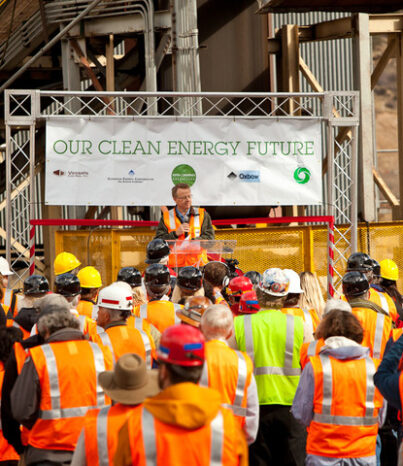
Pic Courtesy of Aspen Ski Company
Aspen Ski Company is equally ferocious in its sustainability pledge — which began in 1997. In 2012, Aspen Skiing Company helped turn an old coal mine into a clean-energy production facility, converting waste methane into useable electricity to power all four of its resorts. In Aspen, there are many on-site solar projects and its Sundeck Restaurant was one of the world’s first LEED-certified buildings, swiftly followed by other hotels, restaurants and employee housing within the resort.

Pic Courtesy of SquawValley
In California, Squaw Valley was the first ski resort to ban the sale of plastic water bottles with its “Drink Mountain Tap” programme introduced in 2016. Water refill stations were fitted across the resort, which estimates to eliminate the use of 28,000 plastic bottles.
Canada

Pic Courtesy of Whistler-Blackcomb
Whistler-Blackcomb is home to Protect Our Winters Canada founder Mike Douglas, and has long been leading the environmental charge.
For the past 12 years it has been named one of Canada’s “greenest employers” and there is a massive amount of work underway including aggressive recycling, recapture and composting programmes, the creation of a Habitat Improvement Team plus installation of water stations and discounted reusable water bottles to reduce single-use plastic.
Whistler has a hydro-renewable energy facility in the centre of the resort, harnessing the power of the Fitzsimmons River.
Retrofits carried out include the installation of nearly 100% LED lighting, electric vehicle charging stations, energy-saving snow-making and high-efficiency hand dryers.
There are some lovely, personal initiatives including the collection of winter clothing for communities both within Canada and as far as Kathmandu, a “Re-Use It Corner” where locals can drop off or pick up unused gear for reuse as well as a carpool programme and bicycle loan programme.
Favourite stories



